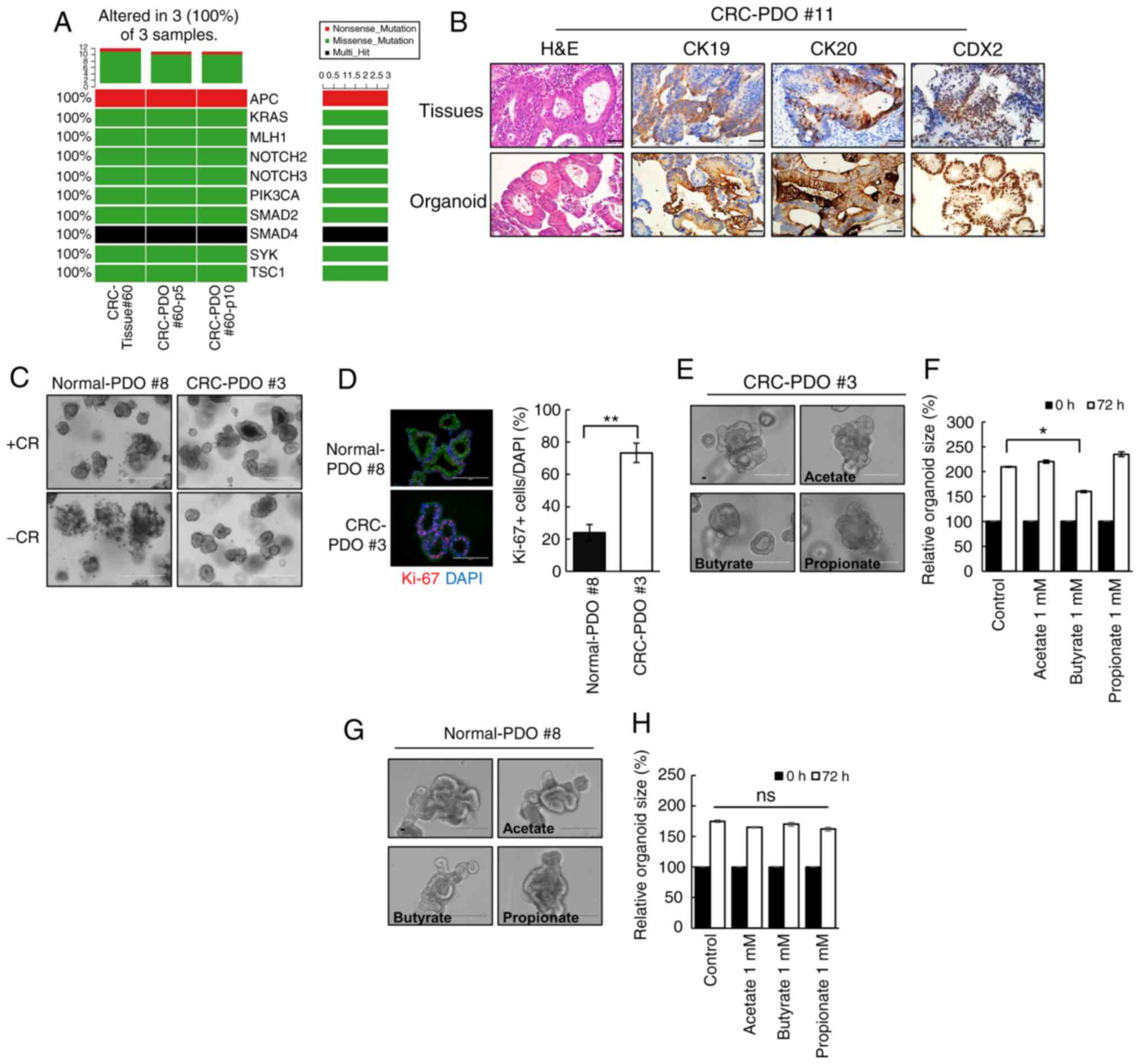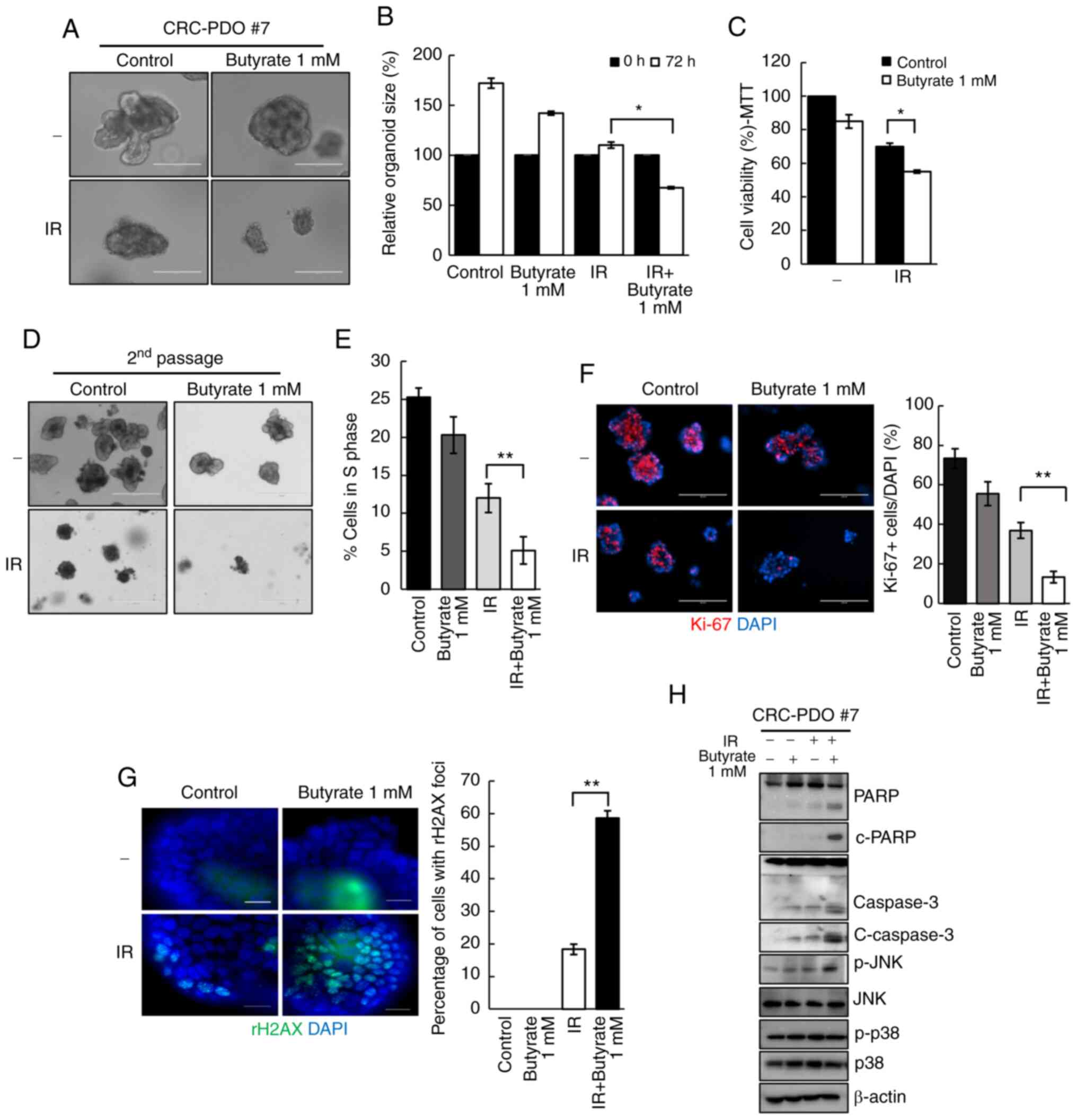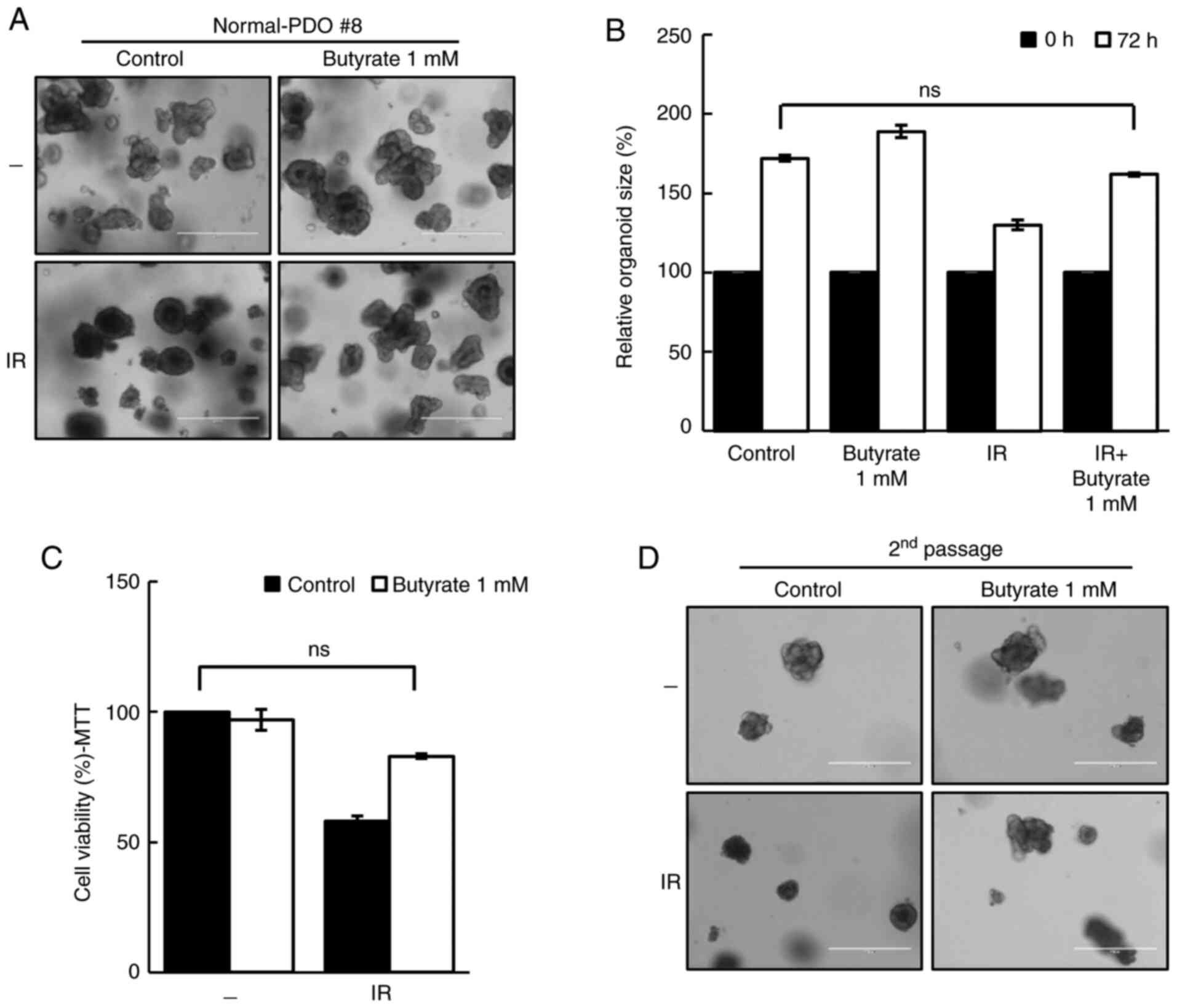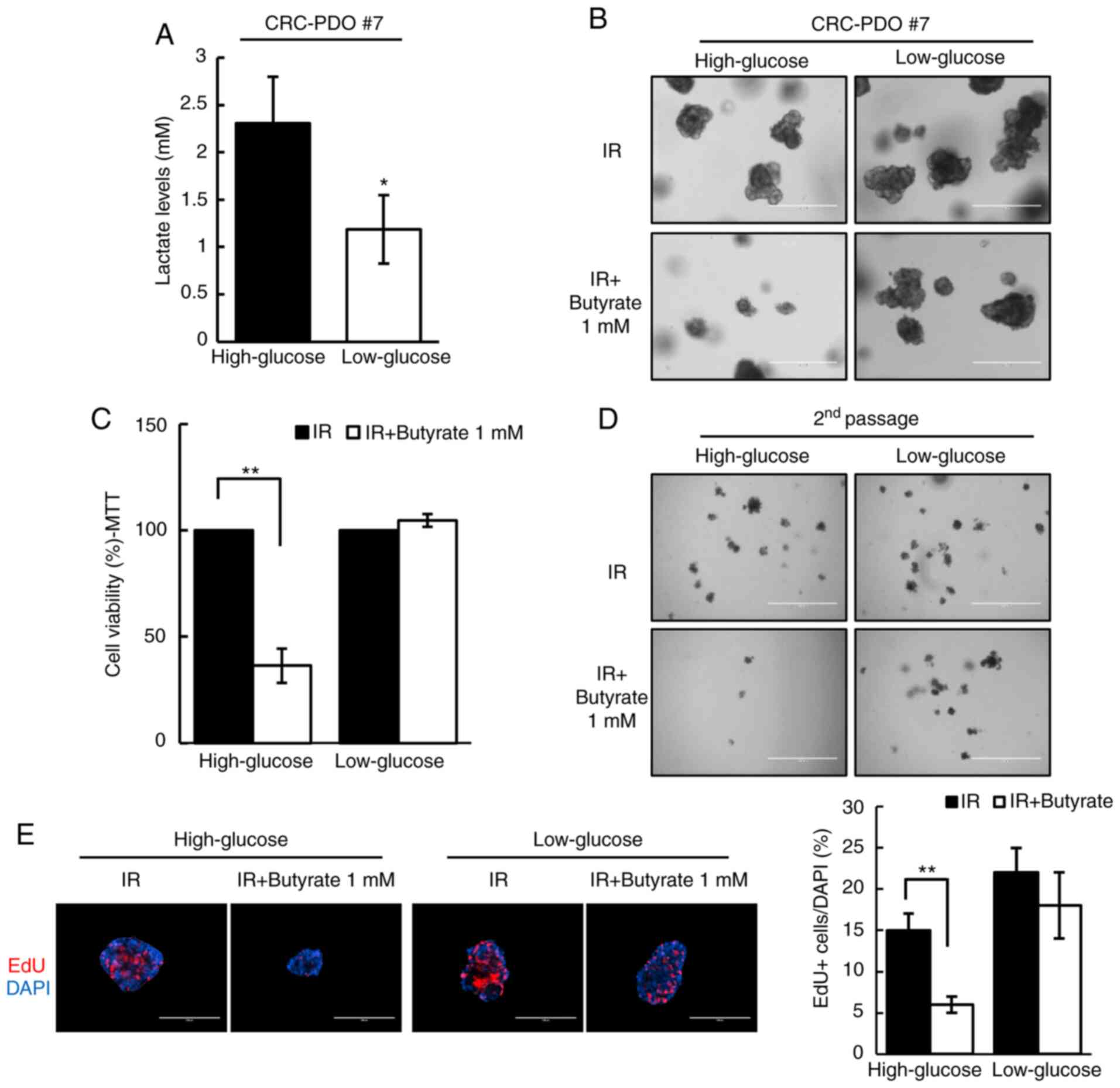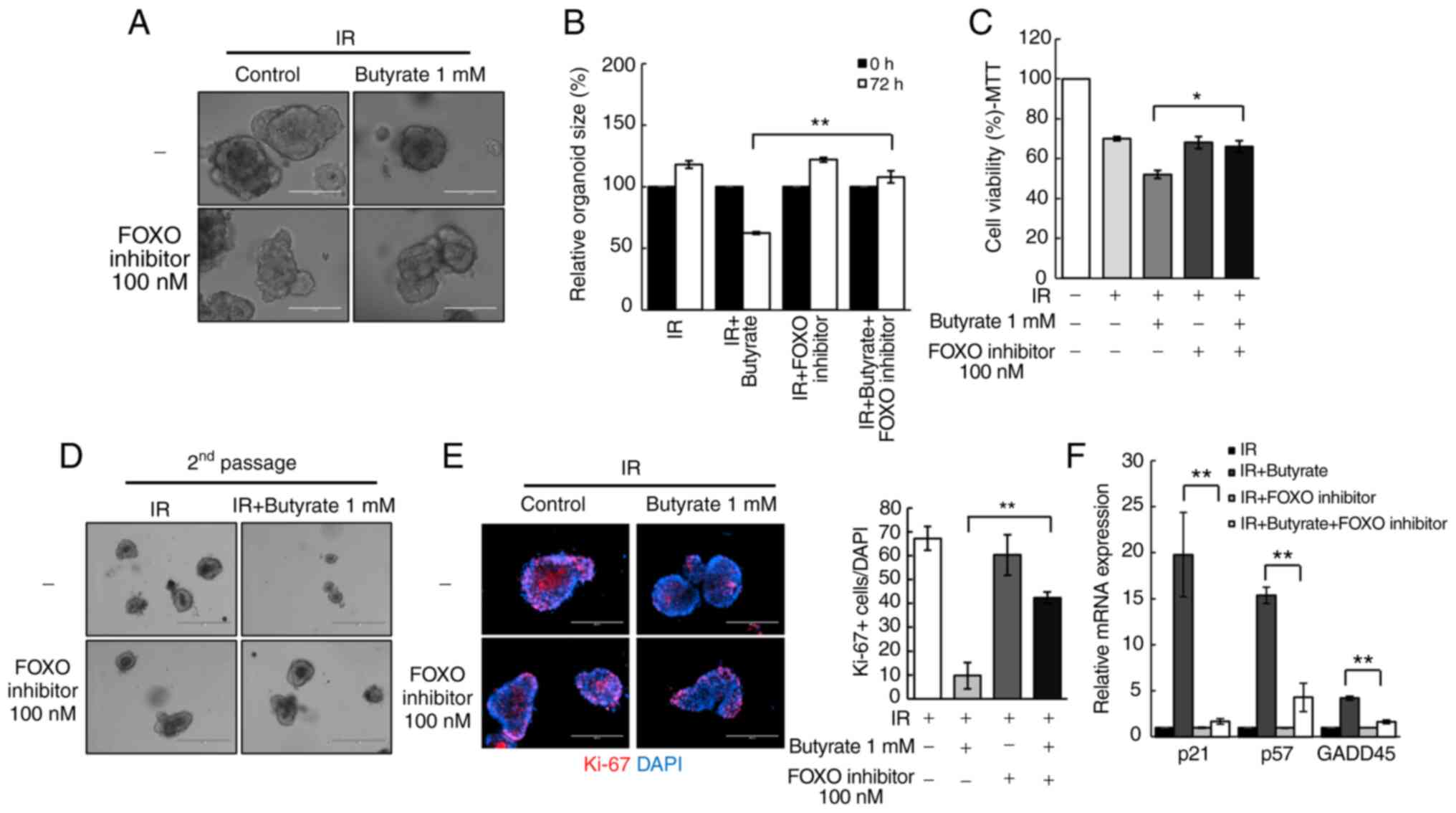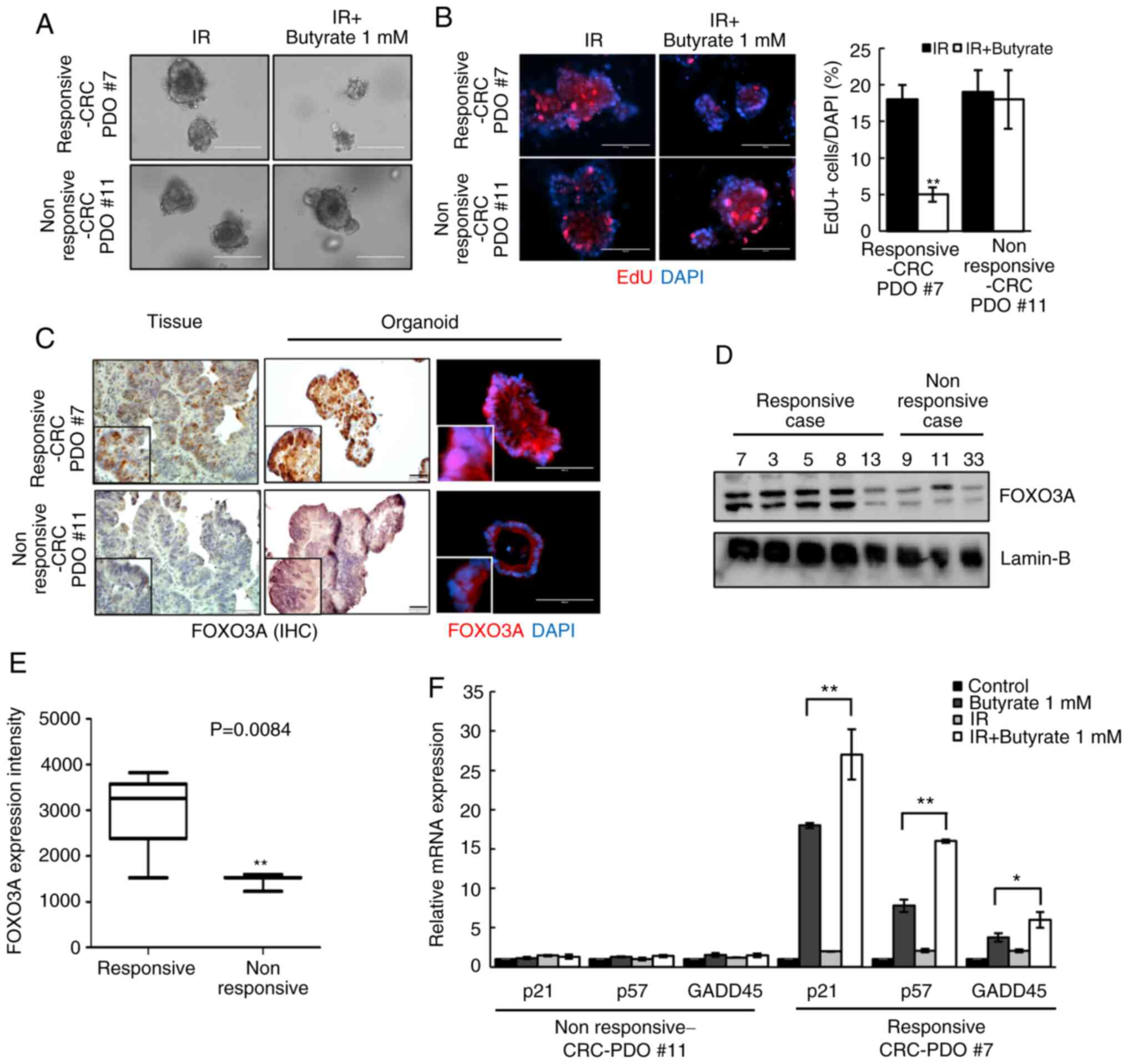|
1
|
Siegel RL, Miller KD, Goding Sauer A,
Fedewa SA, Butterly LF, Anderson JC, Cercek A, Smith RA and Jemal
A: Colorectal cancer statistics, 2020. CA Cancer J Clin.
70:145–164. 2020. View Article : Google Scholar : PubMed/NCBI
|
|
2
|
Guren MG, Dueland S, Skovlund E, Fossa SD,
Poulsen JP and Tveit KM: Quality of life during radiotherapy for
rectal cancer. Eur J Cancer. 39:587–594. 2003. View Article : Google Scholar : PubMed/NCBI
|
|
3
|
Wang H, Mu X, He H and Zhang XD: Cancer
radiosensitizers. Trends Pharmacol Sci. 39:24–48. 2018. View Article : Google Scholar
|
|
4
|
Wolpin BM, Meyerhardt JA, Mamon HJ and
Mayer RJ: Adjuvant treatment of colorectal cancer. CA Cancer J
Clin. 57:168–185. 2007. View Article : Google Scholar : PubMed/NCBI
|
|
5
|
Willett CG, Duda DG, di Tomaso E, Boucher
Y, Ancukiewicz M, Sahani DV, Lahdenranta J, Chung DC, Fischman AJ,
Lauwers GY, et al: Efficacy, safety, and biomarkers of neoadjuvant
bevacizumab, radiation therapy, and fluorouracil in rectal cancer:
A multidisciplinary phase II study. J Clin Oncol. 27:3020–3026.
2009. View Article : Google Scholar : PubMed/NCBI
|
|
6
|
Crane CH, Eng C, Feig BW, Das P, Skibber
JM, Chang GJ, Wolff RA, Krishnan S, Hamilton S, Janjan NA, et al:
Phase II trial of neoadjuvant bevacizumab, capecitabine, and
radiotherapy for locally advanced rectal cancer. Int J Radiat Oncol
Biol Phys. 76:824–830. 2010. View Article : Google Scholar
|
|
7
|
Tomiak A, Vincent M, Kocha W, Taylor M,
Winquist E, Keith B, Sawyer M, Griffeth S, Whiston F and Stitt L:
Standard dose (Mayo regimen) 5-fluorouracil and low dose folinic
acid: Prohibitive toxicity? Am J Clin Oncol. 23:94–98. 2000.
View Article : Google Scholar : PubMed/NCBI
|
|
8
|
Meta-Analysis Group In Cancer; Levy E,
Piedbois P, Buyse M, Pignon JP, Rougier P, Ryan L, Hansen R, Zee B,
Weinerman B, et al: Toxicity of fluorouracil in patients with
advanced colorectal cancer: Effect of administration schedule and
prognostic factors. J Clin Oncol. 16:3537–3541. 1998. View Article : Google Scholar : PubMed/NCBI
|
|
9
|
Cho M, Carter J, Harari S and Pei Z: The
interrelationships of the gut microbiome and inflammation in
colorectal carcinogenesis. Clin Lab Med. 34:699–710. 2014.
View Article : Google Scholar : PubMed/NCBI
|
|
10
|
Arthur JC and Jobin C: The struggle
within: Microbial influences on colorectal cancer. Inflamm Bowel
Dis. 17:396–409. 2011. View Article : Google Scholar
|
|
11
|
Kuwahara A: Contributions of colonic
short-chain fatty acid receptors in energy homeostasis. Front
Endocrinol (Lausanne). 5:1442014. View Article : Google Scholar
|
|
12
|
Vander Heiden MG, Cantley LC and Thompson
CB: Understanding the warburg effect: The metabolic requirements of
cell proliferation. Science. 324:1029–1033. 2009. View Article : Google Scholar : PubMed/NCBI
|
|
13
|
Bultman SJ: Molecular pathways:
Gene-environment interactions regulating dietary fiber induction of
proliferation and apoptosis via butyrate for cancer prevention.
Clin Cancer Res. 20:799–803. 2014. View Article : Google Scholar :
|
|
14
|
Li Q, Cao L, Tian Y, Zhang P, Ding C, Lu
W, Jia C, Shao C, Liu W, Wang D, et al: Butyrate suppresses the
proliferation of colorectal cancer cells via targeting pyruvate
kinase M2 and metabolic reprogramming. Mol Cell Proteomics.
17:1531–1545. 2018. View Article : Google Scholar : PubMed/NCBI
|
|
15
|
Folkvord S, Ree AH, Furre T, Halvorsen T
and Flatmark K: Radiosensitization by SAHA in experimental
colorectal carcinoma models-in vivo effects and relevance of
histone acetylation status. Int J Radiat Oncol Biol Phys.
74:546–552. 2009. View Article : Google Scholar : PubMed/NCBI
|
|
16
|
Chen X, Wong P, Radany E and Wong JY: HDAC
inhibitor, valproic acid, induces p53-dependent radiosensitization
of colon cancer cells. Cancer Biother Radiopharm. 24:689–699. 2009.
View Article : Google Scholar : PubMed/NCBI
|
|
17
|
Flatmark K, Nome RV, Folkvord S, Bratland
A, Rasmussen H, Ellefsen MS, Fodstad Ø and Ree AH:
Radiosensitization of colorectal carcinoma cell lines by histone
deacetylase inhibition. Radiat Oncol. 1:252006. View Article : Google Scholar : PubMed/NCBI
|
|
18
|
Failli A, Consolini R, Legitimo A, Spisni
R, Castagna M, Romanini A, Crimaldi G and Miccoli P: The challenge
of culturing human colorectal tumor cells: Establishment of a cell
culture model by the comparison of different methodological
approaches. Tumori. 95:343–347. 2009. View Article : Google Scholar : PubMed/NCBI
|
|
19
|
Dangles-Marie V, Pocard M, Richon S,
Weiswald LB, Assayag F, Saulnier P, Judde JG, Janneau JL, Auger N,
Validire P, et al: Establishment of human colon cancer cell lines
from fresh tumors versus xenografts: Comparison of success rate and
cell line features. Cancer Res. 67:398–407. 2007. View Article : Google Scholar : PubMed/NCBI
|
|
20
|
van de Wetering M, Francies HE, Francis
JM, Bounova G, Iorio F, Pronk A, van Houdt W, van Gorp J,
Taylor-Weiner A, Kester L, et al: Prospective derivation of a
living organoid biobank of colorectal cancer patients. Cell.
161:933–945. 2015. View Article : Google Scholar : PubMed/NCBI
|
|
21
|
Walsh AJ, Cook RS, Sanders ME, Aurisicchio
L, Ciliberto G, Arteaga CL and Skala MC: Quantitative optical
imaging of primary tumor organoid metabolism predicts drug response
in breast cancer. Cancer Res. 74:5184–5194. 2014. View Article : Google Scholar : PubMed/NCBI
|
|
22
|
Clevers H: Modeling development and
disease with organoids. Cell. 165:1586–1597. 2016. View Article : Google Scholar : PubMed/NCBI
|
|
23
|
Amin MB, Edge S, Greene F, Byrd DR,
Brookland RK, Washington MK, Gershenwald JE, Compton CC, Hess KR,
Sullivan DC, et al: AJCC Cancer Staging Manual. Springer
International Publishing; 2017, View Article : Google Scholar
|
|
24
|
Xie BY and Wu AW: Organoid culture of
isolated cells from patient-derived tissues with colorectal cancer.
Chin Med J (Engl). 129:2469–2475. 2016. View Article : Google Scholar
|
|
25
|
Sato T, Stange DE, Ferrante M, Vries RG,
Van Es JH, Van den Brink S, Van Houdt WJ, Pronk A, Van Gorp J,
Siersema PD and Clevers H: Long-term expansion of epithelial
organoids from human colon, adenoma, adenocarcinoma, and Barrett's
epithelium. Gastroenterology. 141:1762–1772. 2011. View Article : Google Scholar : PubMed/NCBI
|
|
26
|
Fujii M, Shimokawa M, Date S, Takano A,
Matano M, Nanki K, Ohta Y, Toshimitsu K, Nakazato Y, Kawasaki K, et
al: A colorectal tumor organoid library demonstrates progressive
loss of niche factor requirements during tumorigenesis. Cell Stem
Cell. 18:827–838. 2016. View Article : Google Scholar : PubMed/NCBI
|
|
27
|
Cancer Genome Atlas Network: Comprehensive
molecular characterization of human colon and rectal cancer.
Nature. 487:330–337. 2012. View Article : Google Scholar : PubMed/NCBI
|
|
28
|
Grabinger T, Luks L, Kostadinova F,
Zimberlin C, Medema JP, Leist M and Brunner T: Ex vivo culture of
intestinal crypt organoids as a model system for assessing cell
death induction in intestinal epithelial cells and enteropathy.
Cell Death Dis. 5:e12282014. View Article : Google Scholar : PubMed/NCBI
|
|
29
|
Kaiko GE, Ryu SH, Koues OI, Collins PL,
Solnica-Krezel L, Pearce EJ, Pearce EL, Oltz EM and Stappenbeck TS:
The colonic crypt protects stem cells from microbiota-derived
metabolites. Cell. 167:1708–1720. 2016. View Article : Google Scholar
|
|
30
|
Yin X, Farin HF, van Es JH, Clevers H,
Langer R and Karp JM: Niche-independent high-purity cultures of
Lgr5+ intestinal stem cells and their progeny. Nat Methods.
11:106–112. 2014. View Article : Google Scholar :
|
|
31
|
Kinner A, Wu W, Staudt C and Iliakis G:
Gamma-H2AX in recognition and signaling of DNA double-strand breaks
in the context of chromatin. Nucleic Acids Res. 36:5678–5694. 2008.
View Article : Google Scholar : PubMed/NCBI
|
|
32
|
Bozzi F, Mogavero A, Varinelli L, Belfiore
A, Manenti G, Caccia C, Volpi CC, Beznoussenko GV, Milione M, Leoni
V, et al: MIF/CD74 axis is a target for novel therapies in colon
carcinomatosis. J Exp Clin Cancer Res. 36:162017. View Article : Google Scholar : PubMed/NCBI
|
|
33
|
Miyoshi H and Stappenbeck TS: In vitro
expansion and genetic modification of gastrointestinal stem cells
in spheroid culture. Nat Protoc. 8:2471–2482. 2013. View Article : Google Scholar : PubMed/NCBI
|
|
34
|
Park M, Yoon HJ, Kang MC, Kwon J and Lee
HW: MiR-338-5p enhances the radiosensitivity of esophageal squamous
cell carcinoma by inducing apoptosis through targeting survivin.
Sci Rep. 7:109322017. View Article : Google Scholar : PubMed/NCBI
|
|
35
|
Livak KJ and Schmittgen TD: Analysis of
relative gene expression data using real-time quantitative PCR and
the 2(-Delta Delta C(T)) method. Methods. 25:402–408. 2001.
View Article : Google Scholar
|
|
36
|
Mayakonda A, Lin DC, Assenov Y, Plass C
and Koeffler HP: Maftools: Efficient and comprehensive analysis of
somatic variants in cancer. Genome Res. 28:1747–1756. 2018.
View Article : Google Scholar :
|
|
37
|
Donohoe DR, Collins LB, Wali A, Bigler R,
Sun W and Bultman SJ: The warburg effect dictates the mechanism of
butyrate-mediated histone acetylation and cell proliferation. Mol
Cell. 48:612–626. 2012. View Article : Google Scholar : PubMed/NCBI
|
|
38
|
Huang H and Tindall DJ: Dynamic FoxO
transcription factors. J Cell Sci. 120:2479–2487. 2007. View Article : Google Scholar : PubMed/NCBI
|
|
39
|
Zhang X, Tang N, Hadden TJ and Rishi AK:
Akt, FoxO and regulation of apoptosis. Biochim Biophys Acta.
1813:1978–1986. 2011. View Article : Google Scholar : PubMed/NCBI
|
|
40
|
Thangaraju M, Cresci GA, Liu K, Ananth S,
Gnanaprakasam JP, Browning DD, Mellinger JD, Smith SB, Digby GJ,
Lambert NA, et al: GPR109A is a G-protein-coupled receptor for the
bacterial fermentation product butyrate and functions as a tumor
suppressor in colon. Cancer Res. 69:2826–2832. 2009. View Article : Google Scholar : PubMed/NCBI
|
|
41
|
Tan HT, Tan S, Lin Q, Lim TK, Hew CL and
Chung MC: Quantitative and temporal proteome analysis of
butyrate-treated colorectal cancer cells. Mol Cell Proteomics.
7:1174–1185. 2008. View Article : Google Scholar : PubMed/NCBI
|
|
42
|
Pouillart PR: Role of butyric acid and its
derivatives in the treatment of colorectal cancer and
hemoglobinopathies. Life Sci. 63:1739–1760. 1998. View Article : Google Scholar : PubMed/NCBI
|
|
43
|
Boroughs LK and DeBerardinis RJ: Metabolic
pathways promoting cancer cell survival and growth. Nat Cell Biol.
17:351–359. 2015. View Article : Google Scholar : PubMed/NCBI
|
|
44
|
Vernieri C, Casola S, Foiani M,
Pietrantonio F, de Braud F and Longo V: Targeting cancer
metabolism: Dietary and pharmacologic interventions. Cancer Discov.
6:1315–1333. 2016. View Article : Google Scholar : PubMed/NCBI
|
|
45
|
Birkenkamp KU and Coffer PJ: Regulation of
cell survival and proliferation by the FOXO (Forkhead box, class O)
subfamily of Forkhead transcription factors. Biochem Soc Trans.
31:292–297. 2003. View Article : Google Scholar : PubMed/NCBI
|
|
46
|
Schmidt M, Fernandez de Mattos S, van der
Horst A, Klompmaker R, Kops GJ, Lam EW, Burgering BM and Medema RH:
Cell cycle inhibition by FoxO forkhead transcription factors
involves down-regulation of cyclin D. Mol Cell Biol. 22:7842–7852.
2002. View Article : Google Scholar
|
|
47
|
Wang Y, Zhou Y and Graves DT: FOXO
transcription factors: Their clinical significance and regulation.
Biomed Res Int. 2014:9253502014.PubMed/NCBI
|
|
48
|
Yang JY, Chang CJ, Xia W, Wang Y, Wong KK,
Engelman JA, Du Y, Andreeff M, Hortobagyi GN and Hung MC:
Activation of FOXO3a is sufficient to reverse mitogen-activated
protein/extra-cellular signal-regulated kinase kinase inhibitor
chemoresistance in human cancer. Cancer Res. 70:4709–4718. 2010.
View Article : Google Scholar : PubMed/NCBI
|
|
49
|
Yang JY, Xia W and Hu MC: Ionizing
radiation activates expression of FOXO3a, Fas ligand, and Bim, and
induces cell apoptosis. Int J Oncol. 29:643–648. 2006.PubMed/NCBI
|
|
50
|
Yang Y, Pan W, Zhang S, Cao Y, Cheng H,
Chen J and Sun X: Metformin can enhance the radiosensitivity of
cholangiocarcinoma through AMPK-FOXO3a axis. Int J Clin Exp Med.
9:13539–13550. 2016.
|
|
51
|
Li Q, Wei X, Zhou ZW, Wang SN, Jin H, Chen
KJ, Luo J, Westover KD, Wang JM, Wang D, et al: GADD45α sensitizes
cervical cancer cells to radiotherapy via increasing cytoplasmic
APE1 level. Cell Death Dis. 9:5242018. View Article : Google Scholar
|
|
52
|
Milas L, Akimoto T, Hunter NR, Mason KA,
Buchmiller L, Yamakawa M, Muramatsu H and Ang KK: Relationship
between cyclin D1 expression and poor radioresponse of murine
carcinomas. Int J Radiat Oncol Biol Phys. 52:514–521. 2002.
View Article : Google Scholar : PubMed/NCBI
|
|
53
|
Faubert B, Boily G, Izreig S, Griss T,
Samborska B, Dong Z, Dupuy F, Chambers C, Fuerth BJ, Viollet B, et
al: AMPK is a negative regulator of the warburg effect and
suppresses tumor growth in vivo. Cell Metab. 17:113–124. 2013.
View Article : Google Scholar : PubMed/NCBI
|
|
54
|
Dong Z, Yang J, Li L, Tan L, Shi P, Zhang
J, Zhong X, Ge L, Wu Z and Cui H: FOXO3aSIRT6 axis suppresses
aerobic glycolysis in melanoma. Int J Oncol. 56:728–742.
2020.PubMed/NCBI
|
|
55
|
Dong Z, Zhong X, Lei Q, Chen F and Cui H:
Transcriptional activation of SIRT6 via FKHRL1/FOXO3a inhibits the
warburg effect in glioblastoma cells. Cell Signal. 60:100–113.
2019. View Article : Google Scholar : PubMed/NCBI
|
|
56
|
Lawrence TS, Blackstock AW and McGinn C:
The mechanism of action of radiosensitization of conventional
chemotherapeutic agents. Semin Radiat Oncol. 13:13–21. 2003.
View Article : Google Scholar : PubMed/NCBI
|
|
57
|
Chendil D, Ranga RS, Meigooni D,
Sathishkumar S and Ahmed MM: Curcumin confers radiosensitizing
effect in prostate cancer cell line PC-3. Oncogene. 23:1599–1607.
2004. View Article : Google Scholar : PubMed/NCBI
|
|
58
|
Dunne AL, Mothersill C, Robson T, Wilson
GD and Hirst DG: Radiosensitization of colon cancer cell lines by
docetaxel: Mechanisms of action. Oncol Res. 14:447–454. 2004.
View Article : Google Scholar : PubMed/NCBI
|















